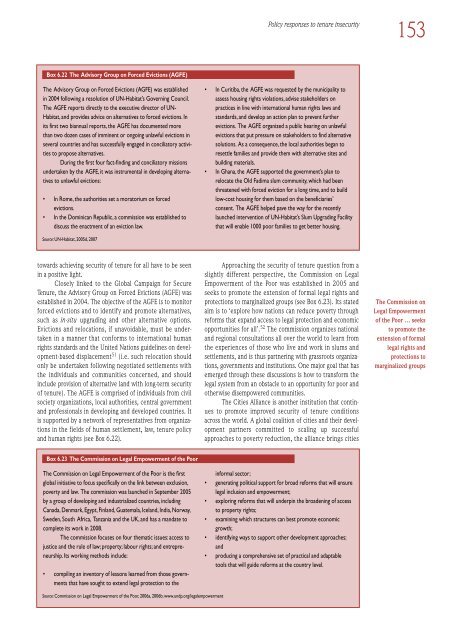Global Report on Human Settlements 2007 - PoA-ISS
Global Report on Human Settlements 2007 - PoA-ISS
Global Report on Human Settlements 2007 - PoA-ISS
You also want an ePaper? Increase the reach of your titles
YUMPU automatically turns print PDFs into web optimized ePapers that Google loves.
Policy resp<strong>on</strong>ses to tenure insecurity<br />
153<br />
Box 6.22 The Advisory Group <strong>on</strong> Forced Evicti<strong>on</strong>s (AGFE)<br />
The Advisory Group <strong>on</strong> Forced Evicti<strong>on</strong>s (AGFE) was established<br />
in 2004 following a resoluti<strong>on</strong> of UN-Habitat’s Governing Council.<br />
The AGFE reports directly to the executive director of UN-<br />
Habitat, and provides advice <strong>on</strong> alternatives to forced evicti<strong>on</strong>s. In<br />
its first two biannual reports, the AGFE has documented more<br />
than two dozen cases of imminent or <strong>on</strong>going unlawful evicti<strong>on</strong>s in<br />
several countries and has successfully engaged in c<strong>on</strong>ciliatory activities<br />
to propose alternatives.<br />
During the first four fact-finding and c<strong>on</strong>ciliatory missi<strong>on</strong>s<br />
undertaken by the AGFE, it was instrumental in developing alternatives<br />
to unlawful evicti<strong>on</strong>s:<br />
• In Rome, the authorities set a moratorium <strong>on</strong> forced<br />
evicti<strong>on</strong>s.<br />
• In the Dominican Republic, a commissi<strong>on</strong> was established to<br />
discuss the enactment of an evicti<strong>on</strong> law.<br />
• In Curitiba, the AGFE was requested by the municipality to<br />
assess housing rights violati<strong>on</strong>s, advise stakeholders <strong>on</strong><br />
practices in line with internati<strong>on</strong>al human rights laws and<br />
standards, and develop an acti<strong>on</strong> plan to prevent further<br />
evicti<strong>on</strong>s. The AGFE organized a public hearing <strong>on</strong> unlawful<br />
evicti<strong>on</strong>s that put pressure <strong>on</strong> stakeholders to find alternative<br />
soluti<strong>on</strong>s. As a c<strong>on</strong>sequence, the local authorities began to<br />
resettle families and provide them with alternative sites and<br />
building materials.<br />
• In Ghana, the AGFE supported the government’s plan to<br />
relocate the Old Fadima slum community, which had been<br />
threatened with forced evicti<strong>on</strong> for a l<strong>on</strong>g time, and to build<br />
low-cost housing for them based <strong>on</strong> the beneficiaries’<br />
c<strong>on</strong>sent. The AGFE helped pave the way for the recently<br />
launched interventi<strong>on</strong> of UN-Habitat’s Slum Upgrading Facility<br />
that will enable 1000 poor families to get better housing.<br />
Source: UN-Habitat, 2005d, <strong>2007</strong><br />
towards achieving security of tenure for all have to be seen<br />
in a positive light.<br />
Closely linked to the <str<strong>on</strong>g>Global</str<strong>on</strong>g> Campaign for Secure<br />
Tenure, the Advisory Group <strong>on</strong> Forced Evicti<strong>on</strong>s (AGFE) was<br />
established in 2004. The objective of the AGFE is to m<strong>on</strong>itor<br />
forced evicti<strong>on</strong>s and to identify and promote alternatives,<br />
such as in-situ upgrading and other alternative opti<strong>on</strong>s.<br />
Evicti<strong>on</strong>s and relocati<strong>on</strong>s, if unavoidable, must be undertaken<br />
in a manner that c<strong>on</strong>forms to internati<strong>on</strong>al human<br />
rights standards and the United Nati<strong>on</strong>s guidelines <strong>on</strong> development-based<br />
displacement 51 (i.e. such relocati<strong>on</strong> should<br />
<strong>on</strong>ly be undertaken following negotiated settlements with<br />
the individuals and communities c<strong>on</strong>cerned, and should<br />
include provisi<strong>on</strong> of alternative land with l<strong>on</strong>g-term security<br />
of tenure). The AGFE is comprised of individuals from civil<br />
society organizati<strong>on</strong>s, local authorities, central government<br />
and professi<strong>on</strong>als in developing and developed countries. It<br />
is supported by a network of representatives from organizati<strong>on</strong>s<br />
in the fields of human settlement, law, tenure policy<br />
and human rights (see Box 6.22).<br />
Approaching the security of tenure questi<strong>on</strong> from a<br />
slightly different perspective, the Commissi<strong>on</strong> <strong>on</strong> Legal<br />
Empowerment of the Poor was established in 2005 and<br />
seeks to promote the extensi<strong>on</strong> of formal legal rights and<br />
protecti<strong>on</strong>s to marginalized groups (see Box 6.23). Its stated<br />
aim is to ‘explore how nati<strong>on</strong>s can reduce poverty through<br />
reforms that expand access to legal protecti<strong>on</strong> and ec<strong>on</strong>omic<br />
opportunities for all’. 52 The commissi<strong>on</strong> organizes nati<strong>on</strong>al<br />
and regi<strong>on</strong>al c<strong>on</strong>sultati<strong>on</strong>s all over the world to learn from<br />
the experiences of those who live and work in slums and<br />
settlements, and is thus partnering with grassroots organizati<strong>on</strong>s,<br />
governments and instituti<strong>on</strong>s. One major goal that has<br />
emerged through these discussi<strong>on</strong>s is how to transform the<br />
legal system from an obstacle to an opportunity for poor and<br />
otherwise disempowered communities.<br />
The Cities Alliance is another instituti<strong>on</strong> that c<strong>on</strong>tinues<br />
to promote improved security of tenure c<strong>on</strong>diti<strong>on</strong>s<br />
across the world. A global coaliti<strong>on</strong> of cities and their development<br />
partners committed to scaling up successful<br />
approaches to poverty reducti<strong>on</strong>, the alliance brings cities<br />
The Commissi<strong>on</strong> <strong>on</strong><br />
Legal Empowerment<br />
of the Poor … seeks<br />
to promote the<br />
extensi<strong>on</strong> of formal<br />
legal rights and<br />
protecti<strong>on</strong>s to<br />
marginalized groups<br />
Box 6.23 The Commissi<strong>on</strong> <strong>on</strong> Legal Empowerment of the Poor<br />
The Commissi<strong>on</strong> <strong>on</strong> Legal Empowerment of the Poor is the first<br />
global initiative to focus specifically <strong>on</strong> the link between exclusi<strong>on</strong>,<br />
poverty and law. The commissi<strong>on</strong> was launched in September 2005<br />
by a group of developing and industrialized countries, including<br />
Canada, Denmark, Egypt, Finland, Guatemala, Iceland, India, Norway,<br />
Sweden, South Africa, Tanzania and the UK, and has a mandate to<br />
complete its work in 2008.<br />
The commissi<strong>on</strong> focuses <strong>on</strong> four thematic issues: access to<br />
justice and the rule of law; property; labour rights; and entrepreneurship.<br />
Its working methods include:<br />
• compiling an inventory of less<strong>on</strong>s learned from those governments<br />
that have sought to extend legal protecti<strong>on</strong> to the<br />
informal sector;<br />
• generating political support for broad reforms that will ensure<br />
legal inclusi<strong>on</strong> and empowerment;<br />
• exploring reforms that will underpin the broadening of access<br />
to property rights;<br />
• examining which structures can best promote ec<strong>on</strong>omic<br />
growth;<br />
• identifying ways to support other development approaches;<br />
and<br />
• producing a comprehensive set of practical and adaptable<br />
tools that will guide reforms at the country level.<br />
Source: Commissi<strong>on</strong> <strong>on</strong> Legal Empowerment of the Poor, 2006a, 2006b; www.undp.org/legalempowerment

















